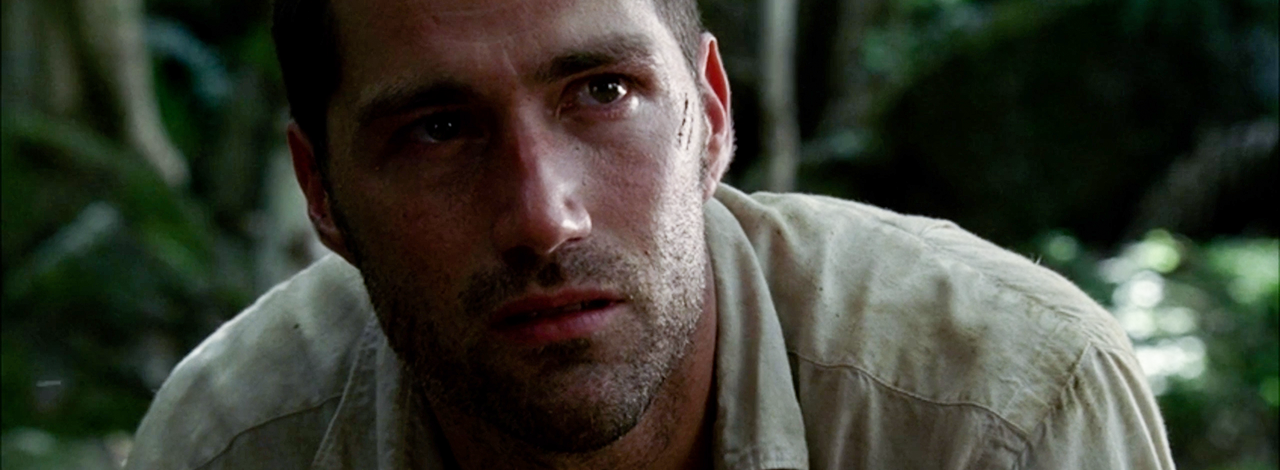IGN has officially been around for two and a half decades, and has borne witness to a lot of monumental shifts in video game and entertainment culture in that time. To celebrate our lengthy tenure on this earth, IGN's 25th Anniversary Feature series will hone in on these shifts, and the movies, video games and TV shows that helped define them. Today, we’re looking back 2004's hit TV show Lost and how it changed television fandom forever.
Today you can’t move on the internet without stumbling over spoilercasts, theory videos, and online conversations about your latest favourite TV show. So it’s hard to believe that as recently as 2004, people simply just watched television and then, at best, spoke about it within their close circles the next day. Even when television shows such as Twin Peaks and The Twilight Zone presented mysteries, theories and discussion often lived or died in the workplace, student halls, or family rooms.
But in 2004, with the rise of new technology and pioneering ideas, a mysterious new hit show for ABC changed the game. It altered the landscape in how we, as fans, engaged with our favourite series. This is the story of how Lost changed the way we watch television forever.
Despite the outlandish budget - at the time, the most expensive pilot ever shot - and the uniquely diverse cast, Lost, the show about survivors of a plane crash on a mysterious island, arrived on television in a very traditional sense. The rollout of episodes followed the pattern of a long-established televisual format, dropping weekly episodes with little more than conventional advertising spaces to promote the next installment. But something else was percolating in the media world; a new medium of entertainment was in its infancy, ready to birth a new form of fan conversation and interaction for a worldwide audience. Podcasting.
“I had no idea what a podcast was,” says Jack Glatfelter, one half of Jay & Jack, a father-and-son hosted Lost podcast.
“For some reason, I had a subscription to USA Today, that was one of the newspapers I had,” recalls Jay Glatfelter. “I think it was the summer of 2005, they had an article about this new thing called podcasting. I thought ‘oh, it's like a blog, but it's an audio blog. This is so cool.”
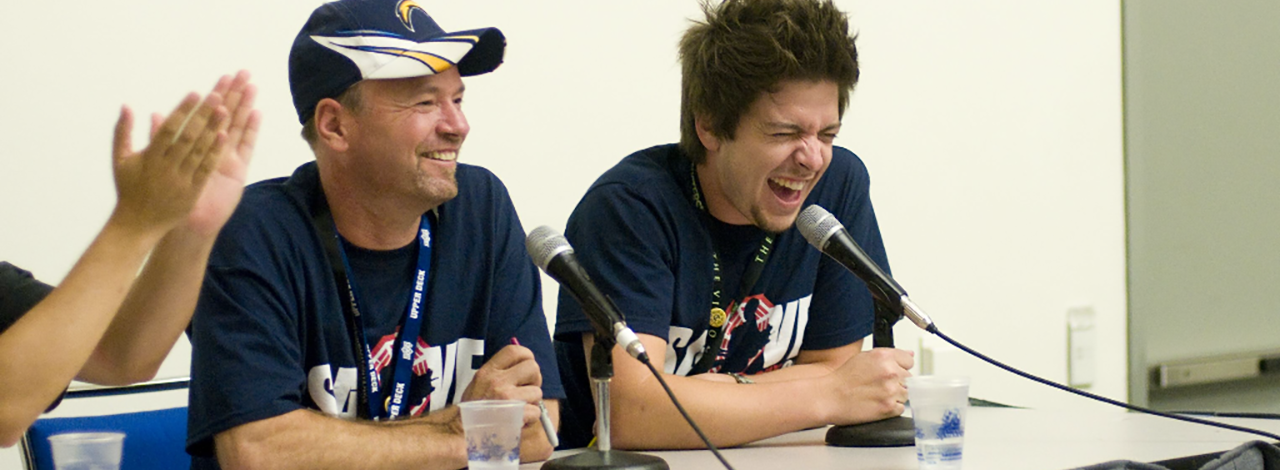
Jay and Jack were huge fans of Lost but were mostly limited to discussing their theories with each other. But the birth of podcasting presented a unique opportunity to create something not only by fans but for fans.
“I really wanted to do something with Jack, ” says Jay. “I always thought he was a really funny personality. So I was like, ‘We need to do something with you on the forefront.' But we kind of tossed around ideas a lot, and then it was in that moment of us just really being into talking about it [Lost]. I was like, ‘Oh my God, we could talk about the show and it would be like a forum, but alive.’”
"The show was just the perfect TV show for a podcast."
Podcasting was extremely new at the time, with a lot of creators still trying to understand what form it could and would take. But the obvious initial comparison was simple: podcasts could be a very niche, modern take on a radio show.
”In radio back then, conversations didn't happen about niche topics the way you would in a forum,” says Jay. “With Lost [we] were able to kind of talk like a talk show, but about these more niche topics, like you would find when you would go in a forum on some topic that you're really passionate about.”
“It was much more about the conversation about the show and like, ‘Oh, hey, did you see this Easter egg?’ Or ‘What about this scene? Let's talk about that’,” Jay adds. “And I think that was much more what it was, as opposed to a review of the episode.”
Like Lost, podcasting began to explode in popularity. The show and the format proving to be a match made in heaven. Dozens of fan podcasts dedicated to combing through the latest episode began to arrive, and this movement was quickly noticed by Lost’s official channels. Spotting a new tool to promote their weekly episodes, the show’s creators started ‘The Official Lost Podcast’ in November of 2005.
“The show was just the perfect show for a podcast,” says Jack. “Because after you watch the show, you're going, ‘Okay, I got to find out what is The Smoke Monster? What is this? I need to get those answers!’”
Lost presented the perfect vehicle for the podcasting world to hitch its ride on, even beyond an avenue to discuss the mysteries fans were eager to solve.
“Remember shippers? The people that were into the relationships? They had their stuff in this show,” says Jay. “You had the sci-fi element. You had the Easter eggs, theories and all that kind of stuff. It had all these different angles, so you had all these different things that you wanted to talk about. And it was still a network TV show, so it was weekly. You had a whole week in between each episode. That's a lot of time for a show like that to percolate ideas, think and theorize, and really dig into every little nitty-gritty minute detail. In the modern world - especially with streaming where you get all at once - there's no big breaks.”
Fans were eager for not only answers but more content. The show had become a phenomenal success, and with that bred a desire for information about this mysterious island and our survivors. So in an effort to uniquely deliver on this salacious desire, the showrunners looked to another media platform: video games.
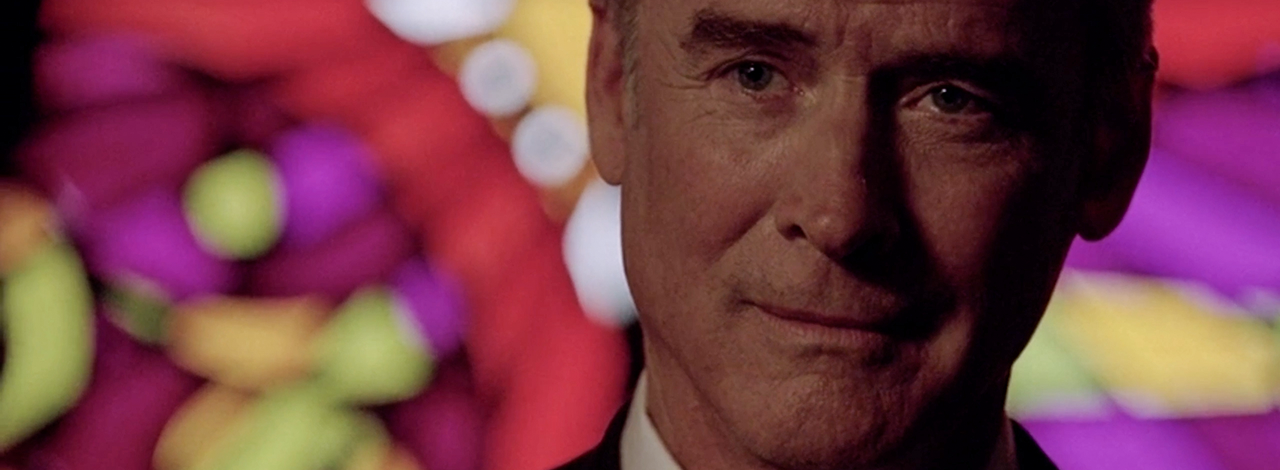
In 2006, Ubisoft announced that it had licensed the rights and begun production on a Lost video game, later revealed to be Lost: Via Domus. Unlike other video games based on television shows of its era, though (The Sopranos: Road to Respect, 24: The Game), the Lost video game would be a true companion piece to the show, contributing towards its lore and, ultimately, serving the audience’s desire to find out more information about the mysterious island. At the beginning of development, though, how to achieve that vision was a little hazy.
“My idea, stupidly, was I wanted to make a shooter based on the Dharma initiative because no one knows what the Dharma initiative was.” says Gadi Pollock, Producer on Lost: Via Domus. “ I thought it would be a really cool mystery, make it really cool shooting where maybe we could go into some of the areas of the island. And I could leverage some of the Far Cry engine technology in the lush islands because it was a no-brainer, right? But it was really shot down because we really needed to be true to the show, and we were afraid that the audience wouldn't really appreciate that type of angle.”
“Today everyone keeps bringing up metaverse, but we were making metaverses when we made the Lost video game."
The showrunners’ vision for the game was simple; this was to be a companion piece for fans of the show to learn more. The decision was then made to run the game’s plot alongside (and intertwined with) the events of the first 70 days of the show’s story.
“So we created a character that was on the plane,” says Pollock. “That character crashed and we built, through the eyes of this character, another point of view in the plane crash and surviving the island.”
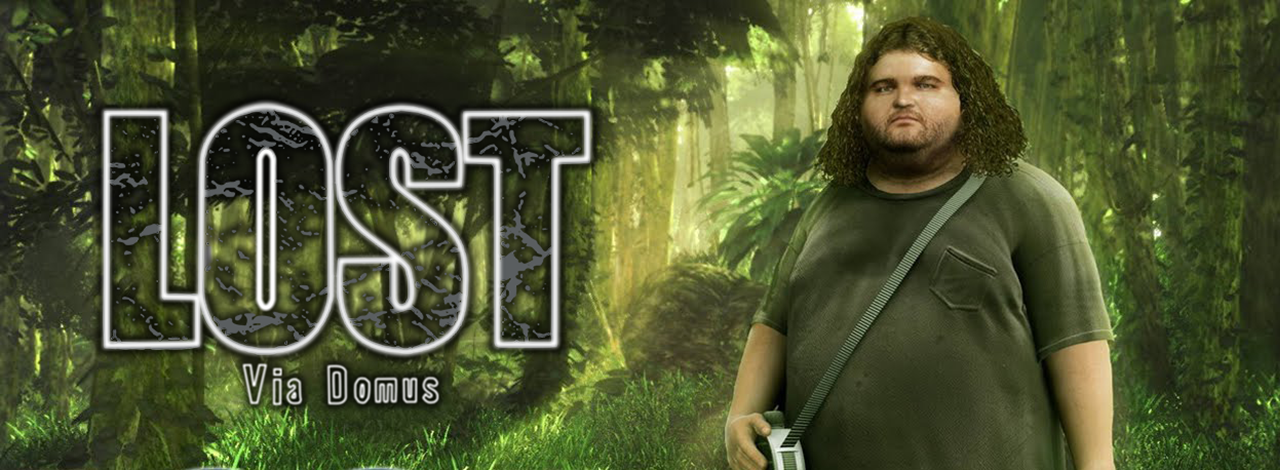
“The audience of Lost is very finicky and it had to be exact,” he adds, “So it was not even a question that we were going to do a spinoff character, but [they also needed to be] living the story of the actual show.”
Lost’s production company, Bad Robot was heavily invested in this idea and worked closely with Ubisoft to make sure everything was perfectly aligned.
“From a story perspective, they were very, very informative. And we spent a lot of time massaging the story with them,” recalls Pollock. “What was good about them is that they allowed us to use whatever we wanted to create the experience for the audience. And I think also as they were evolving with the audience and the show, they also evolved the story because they also picked stuff from us, and we picked up from them. So it was a really true collaborative experience. I really enjoyed it.”
In 2021, the idea of weaving a narrative through different forms of storytelling is very commonplace. It’s part of the foundation of the Marvel Cinematic Universe. But in 2006, the idea of stretching your plot over several mediums in a primitive version of today’s popularised metaverse strategy seemed like a risky proposition.
“Everyone keeps bringing up metaverse and all these things” shares Pollock. “But we were making metaverses when we made the Lost video game with all the different elements attached to it.
“To me, it was more content that was related to the experience for you to grow with the product,” he says. “Not just supplementary content to get you engaged [and] to come spend more money on the platform.”
With detailed podcasts, webisodes (exclusively online, lore-connected clips from the show), and a video game, Lost was truly pioneering the approach to engaging an audience outside of the television screen. But the show’s creators had another trick up their sleeve. One that would fuse the digital and real-world experience of watching Lost. Alternate reality.
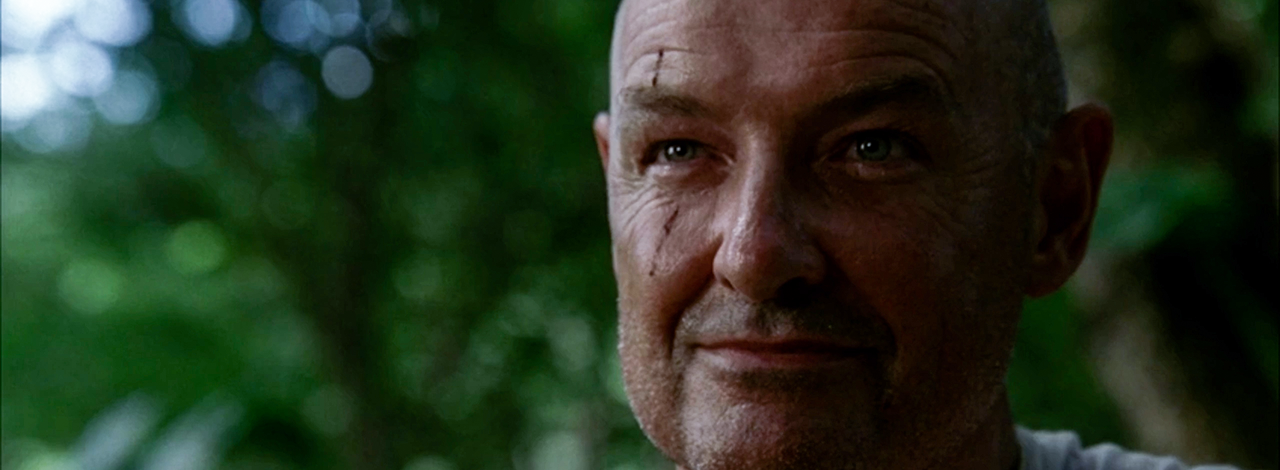
The Lost Experience was an Alternate Reality Game (ARG) that took place between seasons 2 and 3 (with more following after its success). It engaged fans during the off-season break, sending them further down the rabbit hole of mysteries the show had presented. But what exactly is an ARG?
“It's something that exists in the real world,” explains Luke Smith, owner of YouTube channel Hydra Collectables, and passionate Lost fan who experienced the ARGs firsthand. “So you're looking for real-life clues, real-life puzzles. It's spotting things in the real world that other people who aren't playing the game might just walk by.”
Cynically, an ARG can be viewed as a modern marketing tool, capitalising on the most dedicated fans to comb through hints and puzzles teased in other marketing materials, and then subsequently chasing the rabbit to the next clue. This all leads to a (hopefully!) satisfying lore drop you wouldn’t get by simply just watching the show.
"These clues were sprinkled around that directly led to certain aspects of the show. It was just too intriguing not to go ahead and do it."
“That was the first time that I'd ever seen anything quite like it,” recalls Smith. “I knew that something was up the minute I saw the advert in amongst all the normal adverts for Oceanic Airlines.”
The Lost Experience was almost like a modern version of a treasure hunt. Clues were sprinkled throughout official merchandise, and website links buried in fake adverts that sent fans further into the abyss. Clues were hidden in magazines, built into the show’s Comic-Con panels, and even on the inside of Apollo Bars (real-world recreations of the show’s fictional candy bars being sold in stores). These breadcrumbs offered promises of knowledge to those seeking answers about the Hanso Foundation, the fictional shadowy company behind the show’s mysterious Dharma Initiative.
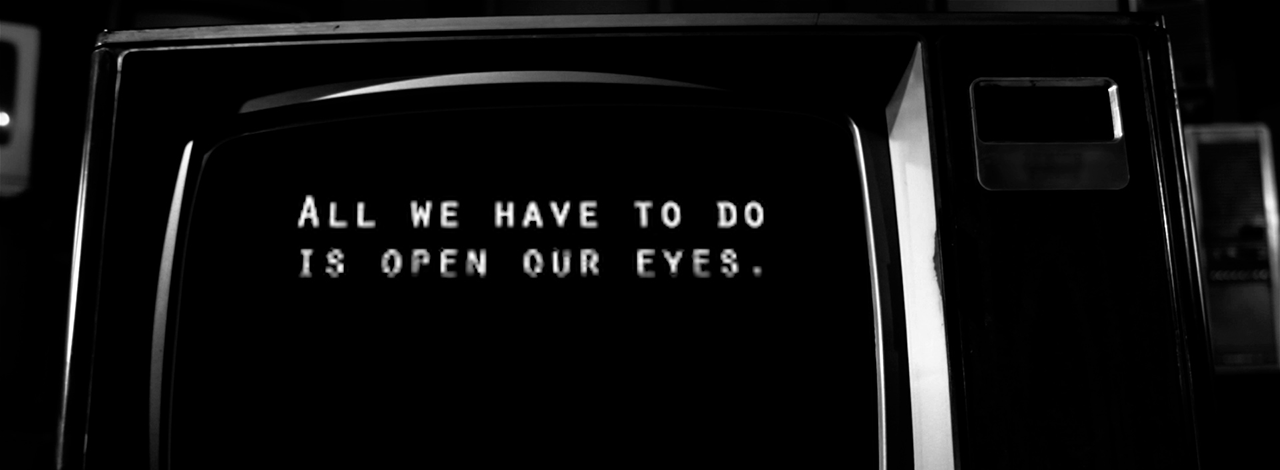
“You went to the Apollo website, you found all these little different clues,” recalls Smith. “And they said that they were going to be doing a limited edition of these chocolate bars in certain cities around the world.
“So at the time of getting these, we didn't know what they were actually for,” he says. “I just stuck mine in my bag, thinking I've got this cool item, I'm going to take it home and keep it, which I have done all this time. And then I heard someone shouting out, ‘Open them up, open them up. You won't believe what's inside!’ And there it was, there was this website.”
The Lost ARG provided a supplementary television experience like no other. Captivating fans by leveraging the latest ideas and ultimately, keeping fans engaged and talking about the show.
“My favorite thing about this show is mystery,” Smith shares. “And the fact that these clues were sprinkled around that directly led to certain aspects of the show. It was just too intriguing not to go ahead and do it. And what we have to also remember is this existed at a time before social media as we know it. So there wasn't any YouTube, there wasn't any Facebook, there wasn't any Instagram. It was literally just people on forums going to actual web pages to discuss what they had found.”
The obtuse, mysterious nature of The Lost Experience felt incredibly on-brand for the show. Along with the other companion pieces of media, it only helped keep Lost in the cultural zeitgeist and bring together a passionate community.
“It really did embed me in the show,” Smith says, clearly passionate about the ARG’s effect. “It made me so much more intrigued and interested. So much so that I'd be recording it from the television, just to rewatch the episodes over and over again, or even slow bits down to try and find more clues. So it really did heighten the show's experience.”
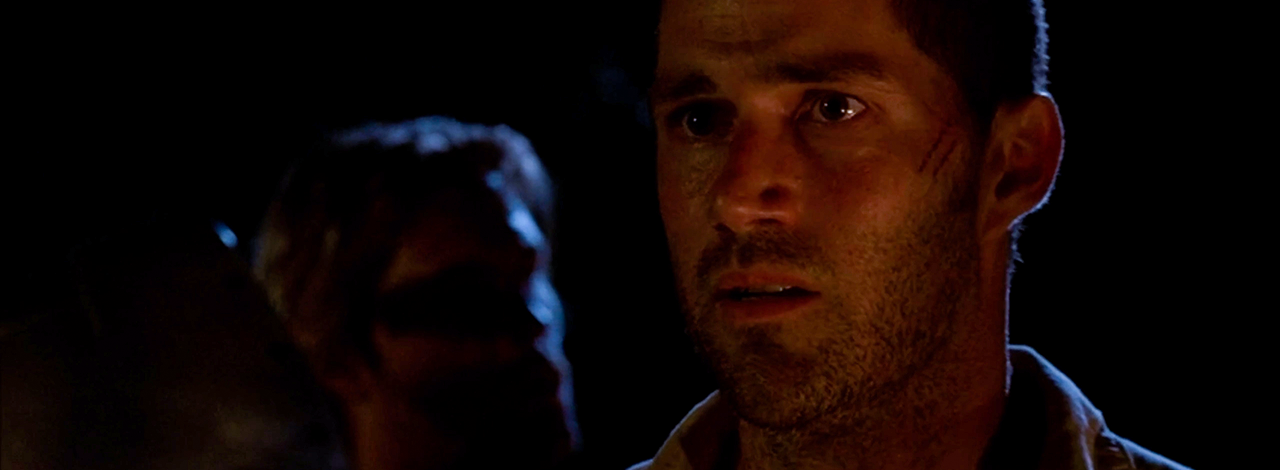
With every piece of supplementary media, the Lost fan base spread further and grew more passionate. And now, with modern means to share, discuss and explore the show’s ideas, a fan base like no other began to emerge.
“It was just people really happy and willing to share information,” recalls Smith. “This is from all over the world. So even when someone would write on the forums, they'd be speaking in their own language and we would have to put it through a very early version of what we would now call Google Translate, so we were able to work out and find these clues. It was the internet before the internet existed. And I didn't realize how close anyone could really be just through those wires, through that internet line.”
Most importantly though, and perhaps unlike other shows, this time it felt like the show’s creators were actually listening to this passionate fan base.
“Nikki and Paulo were a case in point example, right?” says podcaster Jay Glatfelter, referring to two less-than-popular characters introduced in season 3 who were removed from the show almost as swiftly as they were added. “They brought them on. Everybody hated them. Which again, is almost commonplace now, every time some fan franchise adds some new character, there's always backlash. I think they had good intentions for it and I understand the concept behind it, but it wasn't taking. And they were reading comments about it as it was happening on the podcast. And so clearly there was the pivot. But the way they sent them off was such a nod and wink to the fans. It was one of those moments where you could see they were a part of it. And you could sense that they were feeling the disdain of the characters. I think they even would make jokes about them during the podcast at the time. And then they switched and pivoted and killed off the characters, but in a really fun tongue-in-cheek way.”
"They looked to the fans as a source of truth.”
Fans, for the first time, felt like they truly had a voice. If they were loud and united enough, they could influence decisions. It’s something that seems less of a foreign concept these days in the era of Snyder Cuts and online petitions, but back then it was something new.
“That's what's neat, they looked to the fans as a bit of that source of truth,” says Jay, referring to showrunners Damon Lindelof and Carlton Cuse. “Like almost the smell test, does this pass, does this check? They said it doesn't and then they adjusted to it. Whereas now it doesn't always necessarily work. I feel like Last Jedi to the Rise of Skywalker is an example of there was a lot of pushback to The Last Jedi. They clearly did a whole bunch of trying to pivot to what they wanted. And I think it almost made it a lesser product. So it doesn't always necessarily work. But in that sense [Nikki and Paulo], I thought they did a really good job of pivoting and adjusting too. And they probably saw it like ‘we tried this, it didn't work, let's move to something else.’”
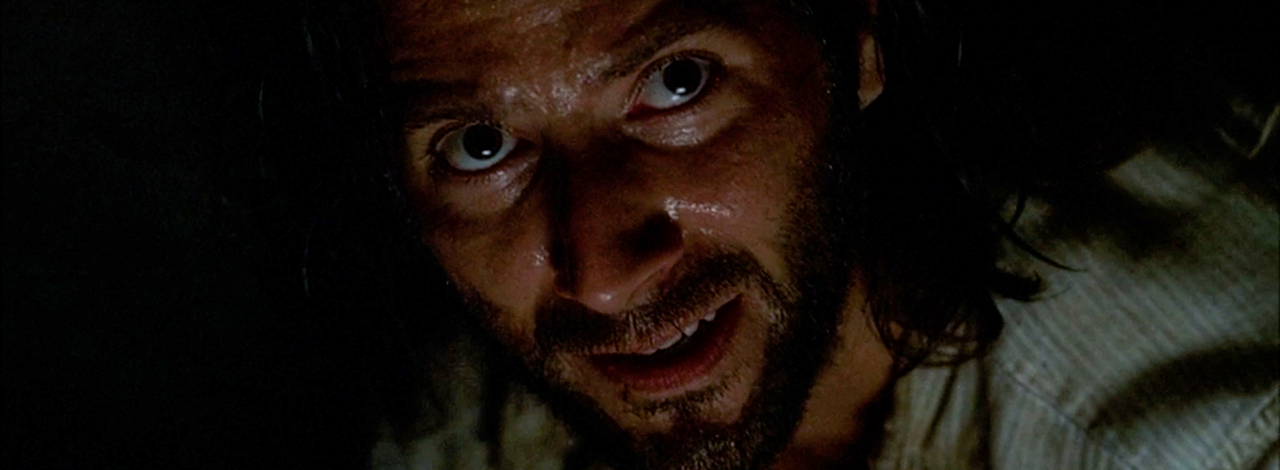
Despite Lost being a multimedia pioneer, incorporating all the latest digital forms it could find to stretch the viewing experience, it also surprisingly (and passionately) clung onto the last intrinsic staple of broadcast television from the previous half-century. Along with a few of its contemporaries, such as Game of Thrones, Lost would be one of the last bastions for something we’d accepted as part of the furniture for a long time. Appointment viewing.
“The reality is that we want things instantly now,” says Pollock. “That's why everything now is on demand. And if it's not now, and it's not today, we're going to lose the attention span.
“You have to have that space to be able to have that level of engagement and interaction,” says Jay. “I think there are shows that rise to that level of Lost, but it doesn't have that space and it doesn't have that need to fill in that space. And so I think there are things that are like appointment TV, but even the Disney Plus stuff you still watch it at your own time. You can't put the toothpaste back in the tube on that one.”
“Yeah, the streaming aspect really hurts,” says Jack. “Because we've done other TV shows and we do Stranger Things, but it's not the same because some people are ahead of where we're talking about. So it kind of hurts.”
“I think to me, it's definitely set the tone for the shows that came after it.”
Lost was clearly a product of its time, hitting a sweet spot in television history. It rode the final wave of appointment television whilst simultaneously launching and co-opting modern media and marketing ideas, drawing the blueprint for television fandom for years to come. Despite its extremely divisive conclusion, it was a huge success on all fronts. But arguably, it might not have worked as well in any other period of entertainment history. It needed to exist in this particular pocket of time to not only have the option to pioneer these ideas but also have the opportunity to truly capitalise on them.
“I think to me, it's definitely set the tone for the shows that came after it,” says Pollock. “I think from a story perspective, it really dictated a lot of the future of not just TV shows, but what gaming storytelling was about, too. I think it is really something that we should definitely remember. To me, the way they shaped the story was just… genius.”
Lost’s techniques molded a fan base like no other. The community was cultivated not only through the contents of the show, but how it nurtured its audience in the gaps. So much so that it built to a crescendo that inevitably, was always going to disappoint a large portion of the rabid fanbase. Hardcore fans desperate for answers they’d been craving for 6, uninterrupted years.
“When the finale happened, there definitely was more negativity,” recalls Jay. “But while it was happening, it was one of the coolest communities to be in.”
“Jack and I, we've done panels on Lost at Comic-Con,” he says. “But we do that Lost panel now and people are coming that didn't watch it while it aired, and they stream it and just watch it straight through. I feel bad for those people because so much of the experience of Lost was the community.”
“There are people that I consider family from those relationships built out of those fan communities,” he adds. “We still meet up once a year and invite a bunch of people to my house from those communities. Friendships from all different walks of life, because of that show.”
Despite your lasting impressions of Lost, there’s no disputing its legacy. What began life as premium television in the most traditional form evolved the landscape so much that we’d never watch television in the same way again. It grew and vocalised fan-driven content, drew the blueprints for modern marketing tools, and pioneered cross-media storytelling. Lost was a show that spent its entire 6-year run adjusting the formula for how a television show could thrive, paving the way for the shows and fandoms that followed. And despite finishing its run in 2010, its legacy will be felt for decades to come. And as Jacob once said, “It only ever ends once. Everything before that is just progress”.
Dale Driver is an IGN Senior Video Producer, and he'd like to thank Jay and Jack Glatfelter, Luke Smith from Hydra Collectibles and Gadi Pollock for all their help and insight. Follow Dale on Twitter.
Continue reading...
Today you can’t move on the internet without stumbling over spoilercasts, theory videos, and online conversations about your latest favourite TV show. So it’s hard to believe that as recently as 2004, people simply just watched television and then, at best, spoke about it within their close circles the next day. Even when television shows such as Twin Peaks and The Twilight Zone presented mysteries, theories and discussion often lived or died in the workplace, student halls, or family rooms.
But in 2004, with the rise of new technology and pioneering ideas, a mysterious new hit show for ABC changed the game. It altered the landscape in how we, as fans, engaged with our favourite series. This is the story of how Lost changed the way we watch television forever.
Part 1: “A leader can’t lead ’til he knows where he’s going.”
Despite the outlandish budget - at the time, the most expensive pilot ever shot - and the uniquely diverse cast, Lost, the show about survivors of a plane crash on a mysterious island, arrived on television in a very traditional sense. The rollout of episodes followed the pattern of a long-established televisual format, dropping weekly episodes with little more than conventional advertising spaces to promote the next installment. But something else was percolating in the media world; a new medium of entertainment was in its infancy, ready to birth a new form of fan conversation and interaction for a worldwide audience. Podcasting.
“I had no idea what a podcast was,” says Jack Glatfelter, one half of Jay & Jack, a father-and-son hosted Lost podcast.
“For some reason, I had a subscription to USA Today, that was one of the newspapers I had,” recalls Jay Glatfelter. “I think it was the summer of 2005, they had an article about this new thing called podcasting. I thought ‘oh, it's like a blog, but it's an audio blog. This is so cool.”
Jay and Jack were huge fans of Lost but were mostly limited to discussing their theories with each other. But the birth of podcasting presented a unique opportunity to create something not only by fans but for fans.
“I really wanted to do something with Jack, ” says Jay. “I always thought he was a really funny personality. So I was like, ‘We need to do something with you on the forefront.' But we kind of tossed around ideas a lot, and then it was in that moment of us just really being into talking about it [Lost]. I was like, ‘Oh my God, we could talk about the show and it would be like a forum, but alive.’”
"The show was just the perfect TV show for a podcast."
Podcasting was extremely new at the time, with a lot of creators still trying to understand what form it could and would take. But the obvious initial comparison was simple: podcasts could be a very niche, modern take on a radio show.
”In radio back then, conversations didn't happen about niche topics the way you would in a forum,” says Jay. “With Lost [we] were able to kind of talk like a talk show, but about these more niche topics, like you would find when you would go in a forum on some topic that you're really passionate about.”
“It was much more about the conversation about the show and like, ‘Oh, hey, did you see this Easter egg?’ Or ‘What about this scene? Let's talk about that’,” Jay adds. “And I think that was much more what it was, as opposed to a review of the episode.”
Like Lost, podcasting began to explode in popularity. The show and the format proving to be a match made in heaven. Dozens of fan podcasts dedicated to combing through the latest episode began to arrive, and this movement was quickly noticed by Lost’s official channels. Spotting a new tool to promote their weekly episodes, the show’s creators started ‘The Official Lost Podcast’ in November of 2005.
“The show was just the perfect show for a podcast,” says Jack. “Because after you watch the show, you're going, ‘Okay, I got to find out what is The Smoke Monster? What is this? I need to get those answers!’”
Lost presented the perfect vehicle for the podcasting world to hitch its ride on, even beyond an avenue to discuss the mysteries fans were eager to solve.
“Remember shippers? The people that were into the relationships? They had their stuff in this show,” says Jay. “You had the sci-fi element. You had the Easter eggs, theories and all that kind of stuff. It had all these different angles, so you had all these different things that you wanted to talk about. And it was still a network TV show, so it was weekly. You had a whole week in between each episode. That's a lot of time for a show like that to percolate ideas, think and theorize, and really dig into every little nitty-gritty minute detail. In the modern world - especially with streaming where you get all at once - there's no big breaks.”
Fans were eager for not only answers but more content. The show had become a phenomenal success, and with that bred a desire for information about this mysterious island and our survivors. So in an effort to uniquely deliver on this salacious desire, the showrunners looked to another media platform: video games.
Part 2 - "You Needed Them, And They Needed You."

In 2006, Ubisoft announced that it had licensed the rights and begun production on a Lost video game, later revealed to be Lost: Via Domus. Unlike other video games based on television shows of its era, though (The Sopranos: Road to Respect, 24: The Game), the Lost video game would be a true companion piece to the show, contributing towards its lore and, ultimately, serving the audience’s desire to find out more information about the mysterious island. At the beginning of development, though, how to achieve that vision was a little hazy.
“My idea, stupidly, was I wanted to make a shooter based on the Dharma initiative because no one knows what the Dharma initiative was.” says Gadi Pollock, Producer on Lost: Via Domus. “ I thought it would be a really cool mystery, make it really cool shooting where maybe we could go into some of the areas of the island. And I could leverage some of the Far Cry engine technology in the lush islands because it was a no-brainer, right? But it was really shot down because we really needed to be true to the show, and we were afraid that the audience wouldn't really appreciate that type of angle.”
“Today everyone keeps bringing up metaverse, but we were making metaverses when we made the Lost video game."
The showrunners’ vision for the game was simple; this was to be a companion piece for fans of the show to learn more. The decision was then made to run the game’s plot alongside (and intertwined with) the events of the first 70 days of the show’s story.
“So we created a character that was on the plane,” says Pollock. “That character crashed and we built, through the eyes of this character, another point of view in the plane crash and surviving the island.”

“The audience of Lost is very finicky and it had to be exact,” he adds, “So it was not even a question that we were going to do a spinoff character, but [they also needed to be] living the story of the actual show.”
Lost’s production company, Bad Robot was heavily invested in this idea and worked closely with Ubisoft to make sure everything was perfectly aligned.
“From a story perspective, they were very, very informative. And we spent a lot of time massaging the story with them,” recalls Pollock. “What was good about them is that they allowed us to use whatever we wanted to create the experience for the audience. And I think also as they were evolving with the audience and the show, they also evolved the story because they also picked stuff from us, and we picked up from them. So it was a really true collaborative experience. I really enjoyed it.”
In 2021, the idea of weaving a narrative through different forms of storytelling is very commonplace. It’s part of the foundation of the Marvel Cinematic Universe. But in 2006, the idea of stretching your plot over several mediums in a primitive version of today’s popularised metaverse strategy seemed like a risky proposition.
“Everyone keeps bringing up metaverse and all these things” shares Pollock. “But we were making metaverses when we made the Lost video game with all the different elements attached to it.
“To me, it was more content that was related to the experience for you to grow with the product,” he says. “Not just supplementary content to get you engaged [and] to come spend more money on the platform.”
With detailed podcasts, webisodes (exclusively online, lore-connected clips from the show), and a video game, Lost was truly pioneering the approach to engaging an audience outside of the television screen. But the show’s creators had another trick up their sleeve. One that would fuse the digital and real-world experience of watching Lost. Alternate reality.
Part 3: “It was a dream, but… it was the most real thing I’ve ever experienced.”

The Lost Experience was an Alternate Reality Game (ARG) that took place between seasons 2 and 3 (with more following after its success). It engaged fans during the off-season break, sending them further down the rabbit hole of mysteries the show had presented. But what exactly is an ARG?
“It's something that exists in the real world,” explains Luke Smith, owner of YouTube channel Hydra Collectables, and passionate Lost fan who experienced the ARGs firsthand. “So you're looking for real-life clues, real-life puzzles. It's spotting things in the real world that other people who aren't playing the game might just walk by.”
Cynically, an ARG can be viewed as a modern marketing tool, capitalising on the most dedicated fans to comb through hints and puzzles teased in other marketing materials, and then subsequently chasing the rabbit to the next clue. This all leads to a (hopefully!) satisfying lore drop you wouldn’t get by simply just watching the show.
"These clues were sprinkled around that directly led to certain aspects of the show. It was just too intriguing not to go ahead and do it."
“That was the first time that I'd ever seen anything quite like it,” recalls Smith. “I knew that something was up the minute I saw the advert in amongst all the normal adverts for Oceanic Airlines.”
The Lost Experience was almost like a modern version of a treasure hunt. Clues were sprinkled throughout official merchandise, and website links buried in fake adverts that sent fans further into the abyss. Clues were hidden in magazines, built into the show’s Comic-Con panels, and even on the inside of Apollo Bars (real-world recreations of the show’s fictional candy bars being sold in stores). These breadcrumbs offered promises of knowledge to those seeking answers about the Hanso Foundation, the fictional shadowy company behind the show’s mysterious Dharma Initiative.

“You went to the Apollo website, you found all these little different clues,” recalls Smith. “And they said that they were going to be doing a limited edition of these chocolate bars in certain cities around the world.
“So at the time of getting these, we didn't know what they were actually for,” he says. “I just stuck mine in my bag, thinking I've got this cool item, I'm going to take it home and keep it, which I have done all this time. And then I heard someone shouting out, ‘Open them up, open them up. You won't believe what's inside!’ And there it was, there was this website.”
The Lost ARG provided a supplementary television experience like no other. Captivating fans by leveraging the latest ideas and ultimately, keeping fans engaged and talking about the show.
“My favorite thing about this show is mystery,” Smith shares. “And the fact that these clues were sprinkled around that directly led to certain aspects of the show. It was just too intriguing not to go ahead and do it. And what we have to also remember is this existed at a time before social media as we know it. So there wasn't any YouTube, there wasn't any Facebook, there wasn't any Instagram. It was literally just people on forums going to actual web pages to discuss what they had found.”
The obtuse, mysterious nature of The Lost Experience felt incredibly on-brand for the show. Along with the other companion pieces of media, it only helped keep Lost in the cultural zeitgeist and bring together a passionate community.
“It really did embed me in the show,” Smith says, clearly passionate about the ARG’s effect. “It made me so much more intrigued and interested. So much so that I'd be recording it from the television, just to rewatch the episodes over and over again, or even slow bits down to try and find more clues. So it really did heighten the show's experience.”
Part 4: “If We Can’t Live Together, We’re Going To Die Alone."

With every piece of supplementary media, the Lost fan base spread further and grew more passionate. And now, with modern means to share, discuss and explore the show’s ideas, a fan base like no other began to emerge.
“It was just people really happy and willing to share information,” recalls Smith. “This is from all over the world. So even when someone would write on the forums, they'd be speaking in their own language and we would have to put it through a very early version of what we would now call Google Translate, so we were able to work out and find these clues. It was the internet before the internet existed. And I didn't realize how close anyone could really be just through those wires, through that internet line.”
Most importantly though, and perhaps unlike other shows, this time it felt like the show’s creators were actually listening to this passionate fan base.
“Nikki and Paulo were a case in point example, right?” says podcaster Jay Glatfelter, referring to two less-than-popular characters introduced in season 3 who were removed from the show almost as swiftly as they were added. “They brought them on. Everybody hated them. Which again, is almost commonplace now, every time some fan franchise adds some new character, there's always backlash. I think they had good intentions for it and I understand the concept behind it, but it wasn't taking. And they were reading comments about it as it was happening on the podcast. And so clearly there was the pivot. But the way they sent them off was such a nod and wink to the fans. It was one of those moments where you could see they were a part of it. And you could sense that they were feeling the disdain of the characters. I think they even would make jokes about them during the podcast at the time. And then they switched and pivoted and killed off the characters, but in a really fun tongue-in-cheek way.”
"They looked to the fans as a source of truth.”
Fans, for the first time, felt like they truly had a voice. If they were loud and united enough, they could influence decisions. It’s something that seems less of a foreign concept these days in the era of Snyder Cuts and online petitions, but back then it was something new.
“That's what's neat, they looked to the fans as a bit of that source of truth,” says Jay, referring to showrunners Damon Lindelof and Carlton Cuse. “Like almost the smell test, does this pass, does this check? They said it doesn't and then they adjusted to it. Whereas now it doesn't always necessarily work. I feel like Last Jedi to the Rise of Skywalker is an example of there was a lot of pushback to The Last Jedi. They clearly did a whole bunch of trying to pivot to what they wanted. And I think it almost made it a lesser product. So it doesn't always necessarily work. But in that sense [Nikki and Paulo], I thought they did a really good job of pivoting and adjusting too. And they probably saw it like ‘we tried this, it didn't work, let's move to something else.’”
Part 5 - “See ya in another life, brother.”

Despite Lost being a multimedia pioneer, incorporating all the latest digital forms it could find to stretch the viewing experience, it also surprisingly (and passionately) clung onto the last intrinsic staple of broadcast television from the previous half-century. Along with a few of its contemporaries, such as Game of Thrones, Lost would be one of the last bastions for something we’d accepted as part of the furniture for a long time. Appointment viewing.
“The reality is that we want things instantly now,” says Pollock. “That's why everything now is on demand. And if it's not now, and it's not today, we're going to lose the attention span.
“You have to have that space to be able to have that level of engagement and interaction,” says Jay. “I think there are shows that rise to that level of Lost, but it doesn't have that space and it doesn't have that need to fill in that space. And so I think there are things that are like appointment TV, but even the Disney Plus stuff you still watch it at your own time. You can't put the toothpaste back in the tube on that one.”
“Yeah, the streaming aspect really hurts,” says Jack. “Because we've done other TV shows and we do Stranger Things, but it's not the same because some people are ahead of where we're talking about. So it kind of hurts.”
“I think to me, it's definitely set the tone for the shows that came after it.”
Lost was clearly a product of its time, hitting a sweet spot in television history. It rode the final wave of appointment television whilst simultaneously launching and co-opting modern media and marketing ideas, drawing the blueprint for television fandom for years to come. Despite its extremely divisive conclusion, it was a huge success on all fronts. But arguably, it might not have worked as well in any other period of entertainment history. It needed to exist in this particular pocket of time to not only have the option to pioneer these ideas but also have the opportunity to truly capitalise on them.
“I think to me, it's definitely set the tone for the shows that came after it,” says Pollock. “I think from a story perspective, it really dictated a lot of the future of not just TV shows, but what gaming storytelling was about, too. I think it is really something that we should definitely remember. To me, the way they shaped the story was just… genius.”
Lost’s techniques molded a fan base like no other. The community was cultivated not only through the contents of the show, but how it nurtured its audience in the gaps. So much so that it built to a crescendo that inevitably, was always going to disappoint a large portion of the rabid fanbase. Hardcore fans desperate for answers they’d been craving for 6, uninterrupted years.
“When the finale happened, there definitely was more negativity,” recalls Jay. “But while it was happening, it was one of the coolest communities to be in.”
“Jack and I, we've done panels on Lost at Comic-Con,” he says. “But we do that Lost panel now and people are coming that didn't watch it while it aired, and they stream it and just watch it straight through. I feel bad for those people because so much of the experience of Lost was the community.”
“There are people that I consider family from those relationships built out of those fan communities,” he adds. “We still meet up once a year and invite a bunch of people to my house from those communities. Friendships from all different walks of life, because of that show.”
Despite your lasting impressions of Lost, there’s no disputing its legacy. What began life as premium television in the most traditional form evolved the landscape so much that we’d never watch television in the same way again. It grew and vocalised fan-driven content, drew the blueprints for modern marketing tools, and pioneered cross-media storytelling. Lost was a show that spent its entire 6-year run adjusting the formula for how a television show could thrive, paving the way for the shows and fandoms that followed. And despite finishing its run in 2010, its legacy will be felt for decades to come. And as Jacob once said, “It only ever ends once. Everything before that is just progress”.
Dale Driver is an IGN Senior Video Producer, and he'd like to thank Jay and Jack Glatfelter, Luke Smith from Hydra Collectibles and Gadi Pollock for all their help and insight. Follow Dale on Twitter.
Continue reading...



